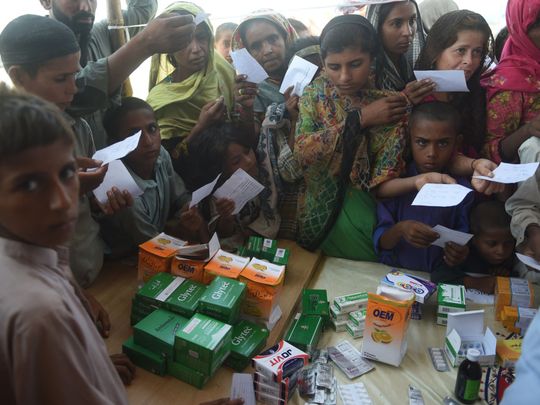
ISLAMABAD: Around 600,000 pregnant women in the flood-affected areas of Sindh, South Punjab, Khyber Pakhtunkhwa (KP) and Balochistan are coping with scant maternal health services and have no safe place even to deliver.
Besides, there are over 5 million children who have little or no immunisation and nutrition care and the government as well as the humanitarian agencies/organisations need to make fast-track efforts to restore reproductive health services for women, pregnant women and children.
These views were shared at the 7th meeting of the Parliamentary Forum on Population (PFP) organised by the Population Council and United Nations Population Fund (UNFPA).
Minister of State for Finance and Revenue, Dr. Aisha Ghous Pasha was present. Members of the Senate, legislators from the national and provincial assemblies and regional body of Gilgit-Baltistan (GB) representing all major political parties attended the meeting. The PFP is a cross-party platform to raise parliamentary awareness on population and development, sustain cross-party political commitment and advocate for population stabilisation.
Addressing the forum, Dr. Aisha Pasha said the international community should channel funds on a priority basis so that support for the climate-hit Pakistan can be ensured.
Dr. Zeba Sathar, Country Director Population Council highlighted that floods in Pakistan have aggravated pre-existing vulnerabilities of marginalised populations. Citing national data, she said 19 million people out of the 31 million living in the severely-affected areas were poor.
More than 22.7 million Kuccha Houses (mud huts) where the displaced population of severely-affected areas lived were most likely destroyed.
Besides women and children, around one million people of 65+ age are living in severely flood affected areas who require special care. People living in agro-climatic zones have lost their cattle and crops and have no access to health services.
Samia Ali Shah Project director Population Council shared the plight of women and children affected by the floods in the severely affected districts, especially how lack of reproductive health services was impacting their lives and that “we must strengthen the community-based service providers to help their communities”.
Need to prioritise women, children’s issues
Parliamentarians called on the donor community to urgently prioritise the needs of women and girls who disproportionately bear the brunt of the devastating impacts of climate change as we are witnessing during the current floods.
They emphasised the need for accelerating provision of maternal health, reproductive health and family planning services along with safe space for women and girls.
Dr Bakhtior Kadirov, Country Representative a.i. UNFPA strongly advocated a comprehen-sive strategy with family planning taking center stage. The policy needs to be implemented by taking all the stakeholders on board, said Dr Bakhtioradding the parliamentarians had a pivotal role to play for the success of this resilience rehabilitation.
He said, “Family planning is part of the healthcare services package that we all are delivering at this time of crisis. UNFPA is ready to play its role in building the resilience of institutions and communities.”












